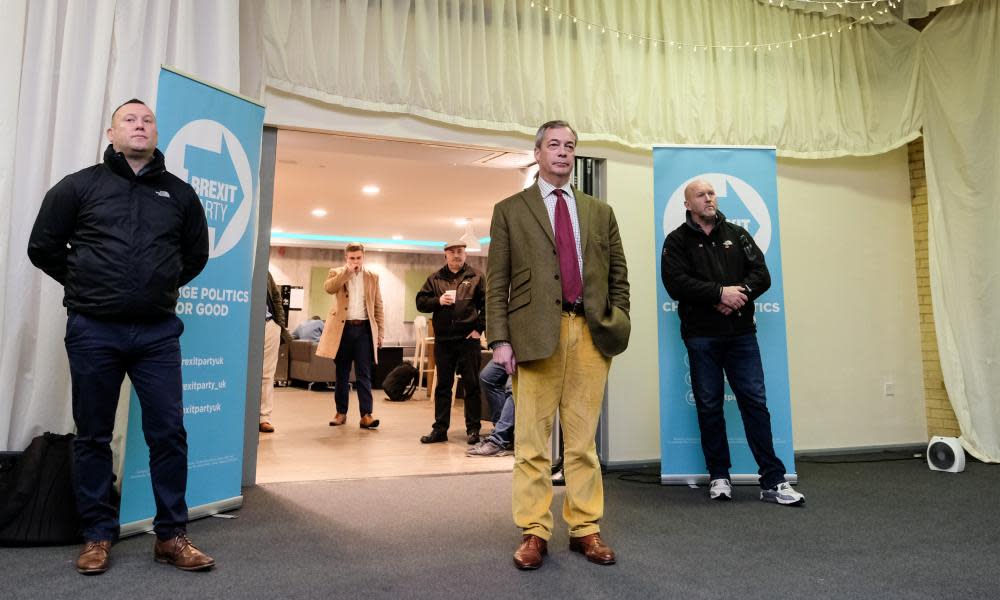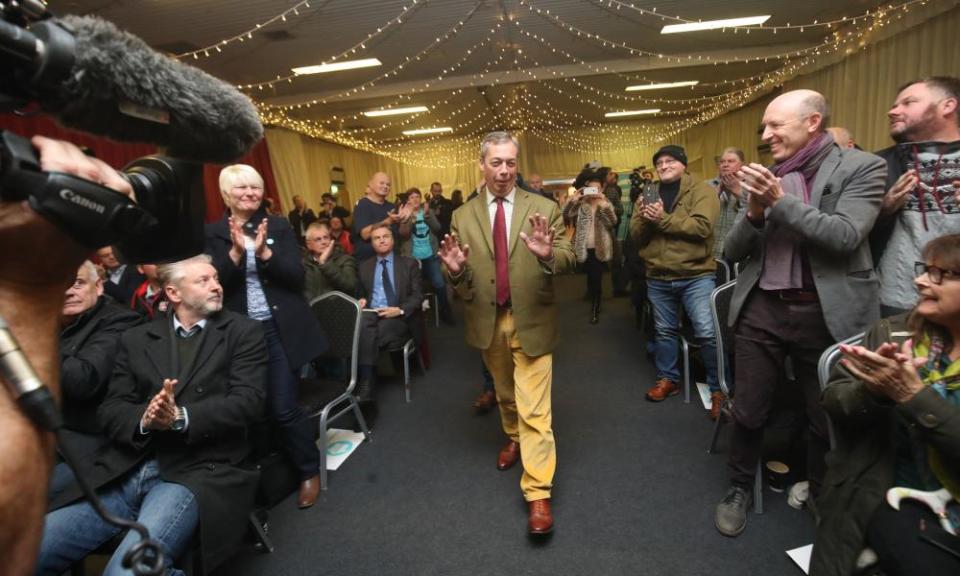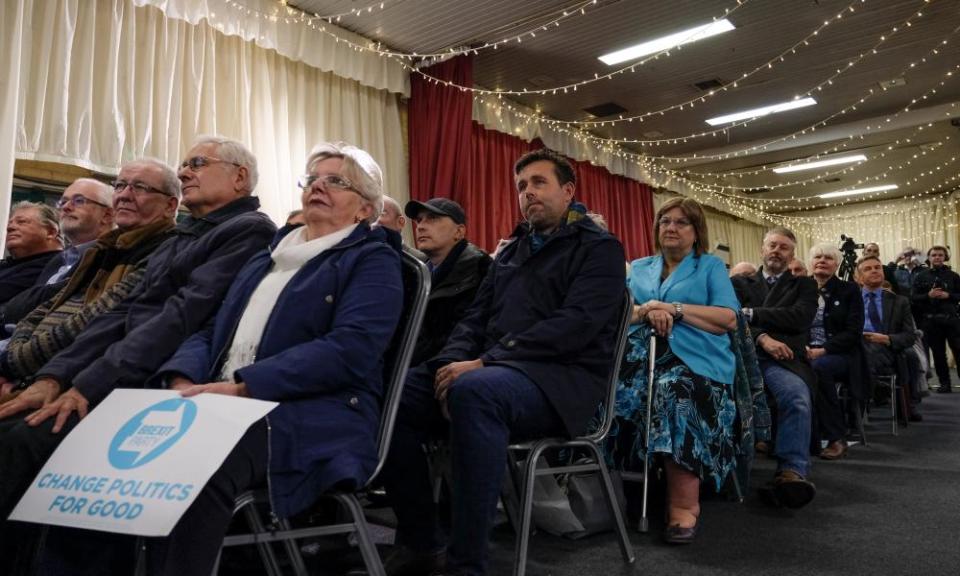Confusion and tactical errors put Brexit party campaign on life support

At Hull Ionians RUFC on a soaking wet Thursday morning last month, chairs were swiftly removed from the back few rows of a Brexit party event. It did the trick. The curtained event space, usually reserved for weddings, suddenly went from looking half empty to almost full.
After the highs of the EU election campaign, when Nigel Farage’s party drew thousands to glitzy rallies, a swathe of empty chairs beneath a glitter ball might not be how he imagined his eighth general election campaign would pan out.
Still, the show goes on. Farage waited in the wings expressionless before exploding into life, striding down the gangway to his soundtrack of the party’s 2019 campaign, Power by Kanye West.
He vigorously shook the hands of those followers who paid £2.50 to attend. “It’s great to be on stage in leave country,” he declared.
“I’m in the heart of a part of England that feels very, very let down by parliament, [the] political class. It’s three-and-a-half years on and we’ve still not got Brexit.”
Except he is in Haltemprice and Howden, the seat of the arch-Eurosceptic David Davis, a former Brexit secretary. Worse, it is not a seat the party is contesting. Running events a few miles into the wrong constituency is one of many hallmarks of a campaign that is now on life support.
In Labour heartlands, where the campaign came to land, the Brexit party wheels out Farage’s greatest hits – the undemocratic EU, the establishment not listening to leave voters, not delivering Brexit, communities ignored by the London-centric left, which has taken votes for granted.
Pints are pulled and sunk in local pubs. At campaign events, Farage gets belly laughs and engages his supporters in very lively back and forths.

His jokes feel hackneyed but they land with aplomb. In Grimsby, he is asked the first thing he would do if and when elected prime minister.
“Go for a pint,” he replies, and the audience goes wild. Yet one woman, who hung on his every word throughout, admits afterwards that she will vote Tory as that is the only option in her Conservative-held Lincolnshire constituency.
If the polls are even close to reality, the Brexit party’s campaign, having never risen above 12%, is flatlining on about 3%. Mercilessly snubbed by the Tories, who appear to prefer losing seats to working with him, Farage’s campaign has struggled to recover from his devastating speech in Hartlepool on 11 November, when he announced he was pulling candidates out of 317 Tory-held seats, to the stunned silence, then nervous applause, of supporters.
There, he told members he was putting country before party and deciding not to split the leave vote. Farage was pegging this dramatic change in direction rather flimsily on a video he had seen on Twitter by Boris Johnson, in which he promised he would not accept an extension of the transition period for Britain leaving the EU beyond the end of 2020.
He also said he wanted to negotiate a “super Canada-plus” trade deal with no political alignment. This was the kind of Brexit Farage could support, although it was not the exact “clean Brexit” he had championed months before in the European election campaign.
The Tories did not return the favour, with no candidates stood down and no formal alliance – leaving Farage appearing weak and without influence. By pulling the handbrake, he squandered any momentum he might have had.
Bewilderment about the strategy raged for days, with some members demanding their money back from the party after having paid £100 to stand in the election.
There was more confusion when the Brexit party candidate in the Labour heartland seat of Dudley North, Rupert Lowe, said he was pulling out to give the Tories a shot.

This was exactly the kind of seat in which the Brexit party was supposed to flourish, and the incident was indicative of a lack of internal discipline.
Days ago, Farage faced the ultimate humiliation when four MEPs, including Annunziata Rees-Mogg, quit the party and urged leavers to vote Tory to deliver Brexit.
In north Wales, the reverberations of pulling out of Conservative seats are still being felt. Paul Thompson, 52, from Craig-y-don in Tory-held Aberconwy, said he was “gutted” not to be able to vote for the party in the election.
He said that from early canvassing in Clwyd West, also held by the Conservatives, there was a positive reaction towards the party.
Sensational stories about the party’s senior figures being offered peerages and positions, including claims that Ann Widdecombe was offered a place in a future Brexit negotiating team by those around Boris Johnson, were brushed off by the Tories.
In Peterborough, a mix-up over Farage’s route through the city during his one of his walkabouts meant a first glimpse of the election campaign bus was missed by the assembled press pack. A trip to Dagenham the next day was swiftly scaled back to include local media only.
In London, the party’s contract for the British people launch, a version of a political manifesto, was small scale and confusing. Some who attended were left wondering what kind of Brexit Farage really wants.
While Farage still enlivens his supporters, he is not the Brexit party’s only strong performer. The businesswoman Michelle Dewberry, from Hull, who stared on the BBC’s The Apprentice, Richard Taylor in Blaenau Gwent – both from Labour families – and Paul Whitehurst in Don Valley all spoke movingly of how their communities have been forgotten by Labour.
Claire Fox, a former Revolutionary Communist party member who is an MEP for North West England, gave rollicking speeches about how no one truly speaks for democracy.
It has also been evident cash is sloshing around, with slick videos produced daily, three election buses, posters and a movable set.
Staff working for the party operate in a way that suggests they are part of a far larger political machine and, ever the optimist, Farage believes in life after 12 December and will rebrand the movement as the Reform party.
But with a few days of campaigning left, the Brexit party’s balloon appears to be deflating with barely a whimper – ignored and outmanoeuvred by the Tories and abandoned by some of its own elected officials.
Farage’s failure to stand led to accusations of cowardice, though he insisted it would be more effective for him to dart around the country than be fixed geographically fighting for one seat.
This election has also marked the end, for now, of Farage’s friendship with the rightwing donor Arron Banks – a fellow “bad boy of Brexit” – who in this election has been telling people to vote Conservative.
Being shut out by the establishment yet again may leave a bitter taste for Farage. If the Tories win the election and the UK leaves the EU, the rugby club function rooms and their glitter balls may leave him behind.

 Yahoo News
Yahoo News 
